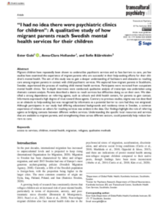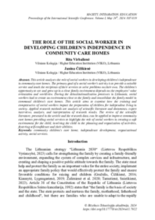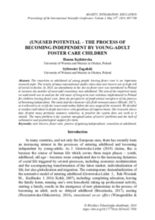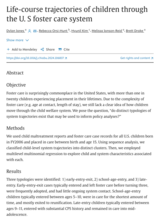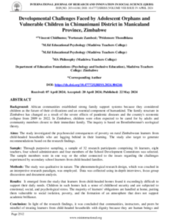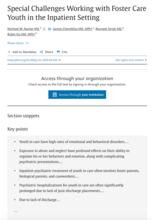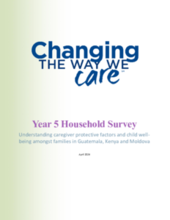Displaying 131 - 140 of 10391
This article aims to trace and present some themes on Sweden's history of transnational adoption, with a particular focus on the public debate and the different narratives that representatives of the adoption triangle—the adoptees, the adoptive parents, and the biological parents—tell when dealing with transnational and transracial adoption as a personal and political phenomenon.
This article aims to examine how the training and competencies of social workers during the deinstitutionalization processes in Lithuania impacted the preparation of children for independent living in society. The review of the scientific literature, presented in the article and the research data, can be applied to improve community care homes providing social services to highlight the role of social workers in creating a safe environment for the child, involving the child in the planning and organization of activities, fostering self-confidence and their abilities.
The aim of this empirical study was to analyse the relevance of long-term care solutions implemented in Poland for children leaving foster care, from the perspective of professional caregivers of the process of becoming independent.
This article details the authors' findings that provide the first description of foster care trajectories in the US. Both practice and policy formulation can benefit from these empirically supported descriptions. Using such trajectory typologies, researchers can now explore how trajectories may predict wellbeing outcomes.
The study investigated the psychosocial consequences of poverty on rural Zimbabwean learners from child-headed households who are lagging behind in their learning. The study also aimed to generate recommendations based on the research findings.
This article details to unique challenges faced by youth in care in the US when receiving inpatient treatment and how that varies in several ways from the care of non-foster care youth. Children in care have more medical, behavioral, and psychiatric problems and require health care at higher rates than youth not engaged in the child welfare system.
This Global Thematic Review on Education examines the under-researched relationship between education and institutional care.
Resistance from donors is a common barrier for organizations transitioning from residential care to family-based care. What works to sustain and even increase funding for organizations in transition?
Dr. Charles Nelson III, a Professor of Pediatrics and Neuroscience and Professor of Education at Harvard University, explains the role of experience in brain development, the effects of early profound deprivation on development, the history of institutional care, and an overview of institutional care at an international conference on 21 March 2024.
The Changing the Way We Care (CTWWC) initiative conducted its Year 5 Household Survey as part of its commitment to building evidence around outcomes for children and families in the context of care reform. The second round of this survey in Kenya and Guatemala, and first round in Moldova, aimed to understand the impact of CTWWC interventions on children and families transitioning from residential care to family-based alternatives or receiving support to prevent separation.

